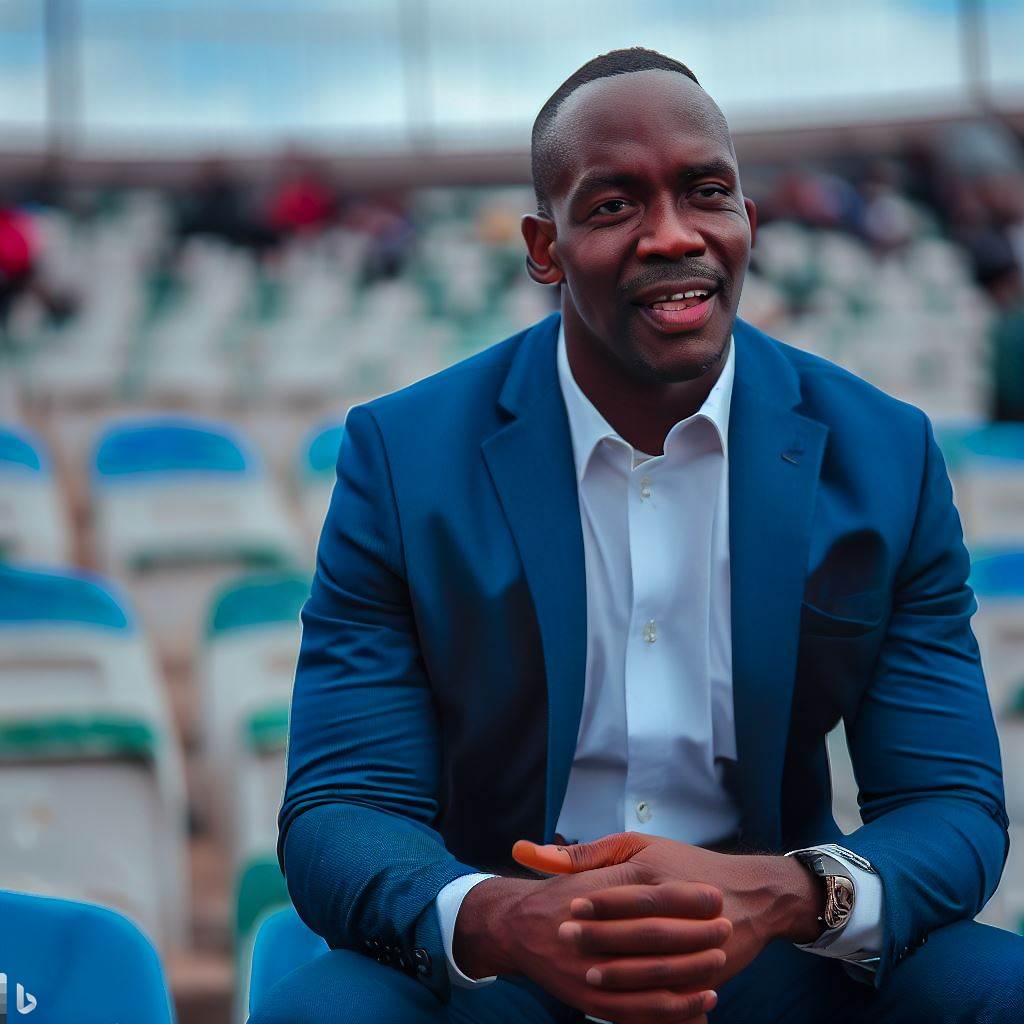Introduction
Sports broadcasting is a crucial aspect of the sports industry, providing a platform for fans to experience the thrill of live events.
In Nigeria, there are abundant opportunities for individuals to pursue a career in sports broadcasting.
A. Importance of Sports Broadcasting
Sports broadcasting plays a vital role in promoting sports, creating a sense of community, and inspiring aspiring athletes.
It allows fans to connect with their favorite teams and players, building a passionate fan base.
Through sports broadcasting, fans can witness the excitement and drama unfolding in real-time, creating a shared experience among viewers.
It helps in generating enthusiasm, which fuels the growth of sports in Nigeria.
B. Opportunities for Nigerians in Sports Broadcasting
Nigerians have numerous opportunities in the field of sports broadcasting. With a vibrant sports culture and passionate fan base, there is a demand for skilled professionals in this industry.
Nigeria’s thriving sports scene offers avenues for aspiring broadcasters to cover various sports, including football, athletics, basketball, boxing, and more.
Broadcasting channels, both traditional and digital, seek talented Nigerians to provide insightful commentary, analysis, and live coverage.
Basically, the rise of social media platforms has revolutionized sports broadcasting, opening up new opportunities for Nigerians to create their own content, engage with fans, and build a personal brand.
Sports broadcasting is not only a means to entertain fans but also a platform for Nigerians to contribute to the growth and development of sports in the country.
With passion, skill, and perseverance, Nigerians can break into the world of sports broadcasting, making a significant impact in the industry.
Understanding the Sports Broadcasting Industry
To excel in sports broadcasting, one must possess strong communication skills and deep sports knowledge.
Educational qualifications, such as a journalism or broadcasting degree, are typically required. Internships offer practical experience and networking opportunities.
A robust portfolio showcasing demo reels and sample broadcasts is essential. Specializing in a specific sport or aspect of sports broadcasting can boost job prospects.
Sports broadcasters must master game rules, provide engaging commentary, and craft compelling narratives during live broadcasts.
They must be comfortable on camera, exuding a commanding presence. Interviewing athletes and coaches may also be part of their role.
Beyond on-air talent, behind-the-scenes positions like producers, directors, and technicians play crucial roles in the industry.
Producers oversee content selection and talent coordination. Directors manage visual elements, including camera angles and graphics.
Technicians handle technical aspects like equipment setup and troubleshooting. Networking, attending industry events, and building connections are essential for breaking into this competitive field.
Continuous skill refinement, staying updated with industry trends, and adapting to new technologies are imperative.
A genuine passion for sports is the foundation of success in sports broadcasting.
By developing skills, gaining experience, and seizing opportunities, Nigerians can pursue rewarding careers in this dynamic industry.
Read: Building a Brand: Assistant Athletic Trainers in Nigeria
Gaining Relevant Education and Training
Gaining relevant education and training is essential for breaking into the field of sports broadcasting.
1. Pursuing a degree in sports journalism, broadcasting, or mass communication
- Enrolling in a reputable university or college that offers a specialized program in sports journalism, broadcasting, or mass communication.
- Taking courses that cover various aspects of sports broadcasting, such as sports reporting, production, and media ethics.
- Gaining practical experience through internships or working for the university’s sports broadcasting team.
2. Participating in training programs and workshops offered by reputable organizations
- Researching and identifying organizations that provide training programs specifically tailored for aspiring sports broadcasters.
- Attending workshops and seminars conducted by industry professionals to learn about the latest trends and techniques in sports broadcasting.
- Networking with other participants and professionals to build valuable connections in the industry.
3. Building a strong foundation of knowledge and skills in sports
- Immersing oneself in the world of sports by watching games, studying player statistics, and analyzing match strategies.
- Reading books, articles, and publications related to sports broadcasting to enhance understanding and stay updated.
- Gaining practical experience by volunteering or freelancing for local sports events to practice commentary and reporting.
By gaining a relevant education and training, aspiring Nigerian sports broadcasters can increase their chances of success in the industry.
Read: Ethics in Sports Journalism: A Guide for Nigerian Professionals
Developing Essential Skills
Aspiring Nigerian sports broadcasters can enhance their success prospects by developing vital skills:
1. Communication Skills
- Master clear, concise communication.
- Adapt language to various audiences.
- Practice active listening for viewer engagement.
2. Public Speaking and Voice Modulation
- Cultivate confidence and charisma.
- Learn tone, pitch, and pace variation.
- Adopt proper breathing techniques for strong voice projection.
3. Knowledge of Sports Rules and Regulations
- Familiarize with sport-specific rules.
- Stay updated on rule changes.
- Understand game nuances for insightful analysis.
4. Research and Analysis Skills
- Conduct thorough research on teams, players, and matches.
- Analyze statistics and historical data.
- Develop critical thinking for informative content delivery.
5. Interviewing Techniques
- Learn effective interview methods.
- Prepare thought-provoking questions.
- Practice active listening and follow-up questions.
By honing these skills, Nigerian sports broadcasters can excel in a competitive field:
- Effective communication engages and informs the audience.
- Public speaking instills confidence and charisma.
- Sports knowledge ensures accurate commentary.
- Research skills enhance broadcasting quality.
- Interviewing techniques extract compelling responses.
Success requires continuous improvement and adaptation:
- Stay updated on industry trends.
- Embrace technological advancements.
- Monitor sports news for relevance.
- Leverage platforms like social media and online streaming for career growth.
Most importantly, Nigerian sports broadcasting success hinges on mastering communication, public speaking, sports knowledge, research, and interviewing.
Strive for improvement, stay updated, and seize new opportunities in this dynamic field.
Read: How to Start a Career in Sports Journalism in Nigeria
Building a Portfolio
To break into sports broadcasting, follow these steps:
- Pursue internships or volunteer roles with local sports teams or media outlets to gain practical experience.
- Create a personal blog or YouTube channel to demonstrate your broadcasting skills and practice on-air presence.
- Attend sports events and network with industry professionals to build valuable relationships and seek mentorship.
- Shadow experienced broadcasters, observe their presentation styles, and learn commentary techniques.
- Dedicate yourself to continuous learning and development in this competitive field.
By seeking hands-on experience through internships and volunteering, you’ll acquire essential skills and forge connections.
Simultaneously, establish an online presence through your blog or YouTube channel to showcase your talent and connect with a broader audience.
Networking at industry events and sports games is vital for gaining insights and potential mentorship.
While attending these events, keenly observe seasoned broadcasters to refine your own style and presentation.
Ultimately, perseverance and a commitment to self-improvement are key to realizing your dream of becoming a successful sports broadcaster.
Read: Salaries in Sports Broadcasting: A Nigerian Perspective

Creating a Standout Resume and Demo Reel
Creating a standout resume and demo reel is crucial when breaking into the world of sports broadcasting.
These tools can help you catch the attention of potential employers and showcase your skills and experience.
Here are some key elements to consider:
Relevant education, training, and experience
- Include your educational background, such as degrees or certifications in broadcasting, journalism, or related fields.
- Highlight any specialized training you have received, such as courses in sports commentary or camera operation.
- Showcase your previous experience in sports broadcasting, whether it’s through internships, part-time jobs, or volunteer work.
Notable achievements and accolades
- Mention any awards or recognitions you have received for your work, such as being named “Best Sports Broadcaster” in a local competition.
- Highlight any notable interviews or coverage you have done, especially if it involved high-profile athletes or events.
- Showcase any positive feedback or testimonials you have received from colleagues or supervisors in the industry.
Showcasing the best moments from previous broadcasts
- Select the most exciting and impactful moments from your previous broadcasts to include in your demo reel.
- Ensure that the footage is of high quality, well-edited, and showcases your abilities as a sports broadcaster.
- Include a variety of sports and events to demonstrate your versatility and adaptability as a broadcaster.
By following these guidelines, you can create a resume and demo reel that stand out from the competition and impress potential employers.
Additionally, here are some general tips to keep in mind:
- Keep your resume concise and well-organized, focusing on the most relevant information.
- Use action verbs to describe your experience and accomplishments, such as “hosted,” “interviewed,” or “analyzed.”
- Proofread your resume and demo reel carefully to avoid any grammatical or spelling errors.
- Tailor your resume and demo reel to each specific job application, highlighting the skills and experience that are most relevant.
- Consider seeking feedback from industry professionals or mentors to improve your resume and demo reel.
Remember, your resume and demo reel are your first impression in the sports broadcasting industry.
Take the time to make them professional, engaging, and reflective of your unique skills and abilities.
With a standout resume and demo reel, you’ll be well on your way to breaking into sports broadcasting in Nigeria.
Finding Job Opportunities
- Research available positions with sports networks, radio stations, and online platforms.
- Check the websites and social media pages of these organizations for job postings.
- Contact local sports teams and organizations directly to inquire about potential broadcasting openings.
- Attend sports events and network with professionals in the industry to discover hidden opportunities.
- Utilize online job boards and professional networking websites to search for sports broadcasting jobs.
- Create profiles on websites like LinkedIn to showcase your skills and connect with industry professionals.
- Stay updated on industry events and conferences that may feature job fairs or networking opportunities.
- Build relationships with mentors and experienced broadcasters who can provide guidance and job leads.
- Keep an eye on industry publications and trade magazines for job listings and industry news.
- Be proactive and persistent in your job search, reaching out to potential employers regularly.
By following these steps, you can increase your chances of finding job opportunities in the sports broadcasting field.
Networking, researching, and staying updated on industry trends will be key in breaking into this competitive industry.
Nurturing Professional Growth
Here are some strategies to nurture your professional growth in the field of sports broadcasting:
A. Continuing education and staying up-to-date with current trends in sports broadcasting
- Enroll in specialized courses or workshops to enhance your skills and knowledge in sports broadcasting.
- Read industry publications and websites to stay informed about the latest developments and trends.
- Attend conferences or seminars where industry experts discuss new techniques and technologies.
- Network with other professionals in the field to exchange ideas and stay updated.
B. Seeking feedback and constructive criticism from mentors or industry professionals
- Develop relationships with experienced professionals who can provide valuable feedback and guidance.
- Regularly seek feedback on your work and be open to constructive criticism.
- Take feedback as an opportunity to learn and improve your skills.
- Actively seek out mentors who can provide valuable insights and advice.
C. Expanding skills and knowledge in different sports or broadcasting techniques
- Expand your repertoire by learning about different sports and their nuances.
- Practice commentating or reporting on various sports to gain versatility.
- Learn about different broadcasting techniques such as radio, television, online streaming, and podcasting.
- Experiment with different presentation styles to find your own unique voice.
By actively pursuing these strategies, you can nurture your professional growth and increase your prospects in the field of sports broadcasting.
Conclusion
We have discussed the key points to breaking into sports broadcasting for Nigerians.
We have emphasized the importance of developing a strong foundation in journalism and communication, as well as gaining relevant experience through internships and volunteering.
It is crucial to build a network within the sports industry, attending events and connecting with professionals.
We have also highlighted the significance of continuously honing your skills, staying updated with technological advancements, and being adaptable in a dynamic field.
Sports broadcasting can offer exciting opportunities, allowing you to combine your passion for sports and communication.
To aspiring Nigerian sports broadcasters, we encourage you to pursue your dreams and follow the steps outlined in this guide.
Work hard, believe in yourself, and remain determined in the face of challenges.
Remember that success in sports broadcasting requires perseverance and continuous learning.
With dedication and a strong work ethic, you can excel in this competitive industry.
Lastly, we believe that Nigerian sports broadcasters have the potential to make a significant impact on the global sports landscape.
Embrace the opportunities, have faith in your abilities, and go after your dreams with unwavering commitment.
Best of luck on your journey to becoming a successful sports broadcaster in Nigeria!




